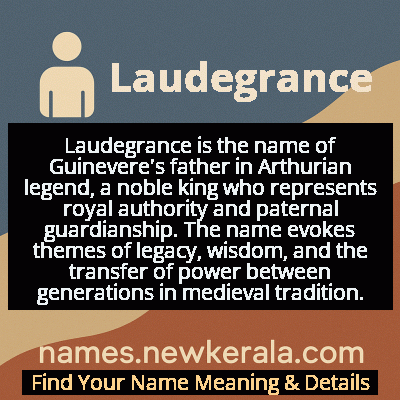Laudegrance Name Meaning & Details
Origin, Popularity, Numerology Analysis & Name Meaning of Laudegrance
Discover the origin, meaning, and cultural significance of the name LAUDEGRANCE. Delve into its historical roots and explore the lasting impact it has had on communities and traditions.
Name
Laudegrance
Gender
Male
Origin
Arthurian
Lucky Number
1
Meaning of the Name - Laudegrance
Laudegrance is the name of Guinevere's father in Arthurian legend, a noble king who represents royal authority and paternal guardianship. The name evokes themes of legacy, wisdom, and the transfer of power between generations in medieval tradition.
Laudegrance - Complete Numerology Analysis
Your Numerology Number
Based on Pythagorean Numerology System
Ruling Planet
Sun
Positive Nature
Leaders, ambitious, highly driven, self-reliant, innovative.
Negative Traits
Overly aggressive, domineering, impatient, selfish.
Lucky Colours
Red, orange, gold.
Lucky Days
Sunday.
Lucky Stones
Ruby, garnet.
Harmony Numbers
2, 3, 9.
Best Suited Professions
Entrepreneurs, managers, engineers.
What People Like About You
Courage, determination, leadership.
Famous People Named Laudegrance
Leodegrance of Cameliard
Arthurian King
Father of Queen Guinevere and trusted ally of King Arthur
Lord Laudegrance
Mythical Ruler
Keeper of the Round Table before Arthur's reign
King Leodogran
Literary Character
Featured in Tennyson's 'Idylls of the King' as Guinevere's father
Name Variations & International Equivalents
Click on blue names to explore their detailed meanings. Gray names with will be available soon.
Cultural & Historical Significance
Extended Personality Analysis
Laudegrance is characterized by a blend of royal dignity, paternal concern, and political wisdom. As an experienced ruler, he demonstrates careful judgment in assessing Arthur's suitability as both a king and husband for his daughter. His personality reflects the medieval ideal of the wise elder—patient, deliberate, and focused on long-term stability rather than immediate gain. He shows strong protective instincts toward his daughter and kingdom, yet also recognizes the need for strategic alliances to ensure their future security. Laudegrance exhibits loyalty and trustworthiness, qualities that make him a reliable ally to Arthur and a respected figure among other kings. His decision to entrust both his daughter and the symbolic Round Table to Arthur demonstrates remarkable faith and foresight. This combination of cautious wisdom and bold trust makes him a compelling figure who represents the best qualities of medieval nobility—honor, responsibility, and the ability to recognize and support true greatness in others.
Modern Usage & Popularity
In contemporary times, Laudegrance remains an exceptionally rare name, primarily confined to academic discussions of Arthurian literature and specialized historical contexts. It has never achieved mainstream popularity and doesn't appear in modern baby name registries or databases. The name's usage is almost exclusively limited to character names in Arthurian retellings, fantasy literature, and occasional references in historical fiction. Its complexity and strong association with a specific medieval literary tradition make it impractical for everyday use, though it occasionally surfaces in creative writing circles or among enthusiasts of British mythology. The name's modern presence is more scholarly than practical, serving as an example of how Arthurian names evolve through different literary traditions rather than as a viable contemporary given name.
Symbolic & Spiritual Meanings
Symbolically, Laudegrance represents the crucial role of established authority in validating new leadership and ensuring continuity between generations. As the keeper who passes the Round Table to Arthur, he embodies the concept of legitimate succession and the importance of blessing from previous rulers. His paternal relationship to Guinevere makes him a symbol of protective authority and the careful stewardship of royal lineage. The name evokes themes of wisdom in transition, the importance of alliance-building, and the bridge between tradition and innovation. In broader symbolic terms, Laudegrance represents the idea that true power comes not just from strength or conquest, but from the recognition and support of established structures and lineages. His character symbolizes how legacy, when properly managed and transferred, can create foundations for greater achievements than any single generation could accomplish alone.

